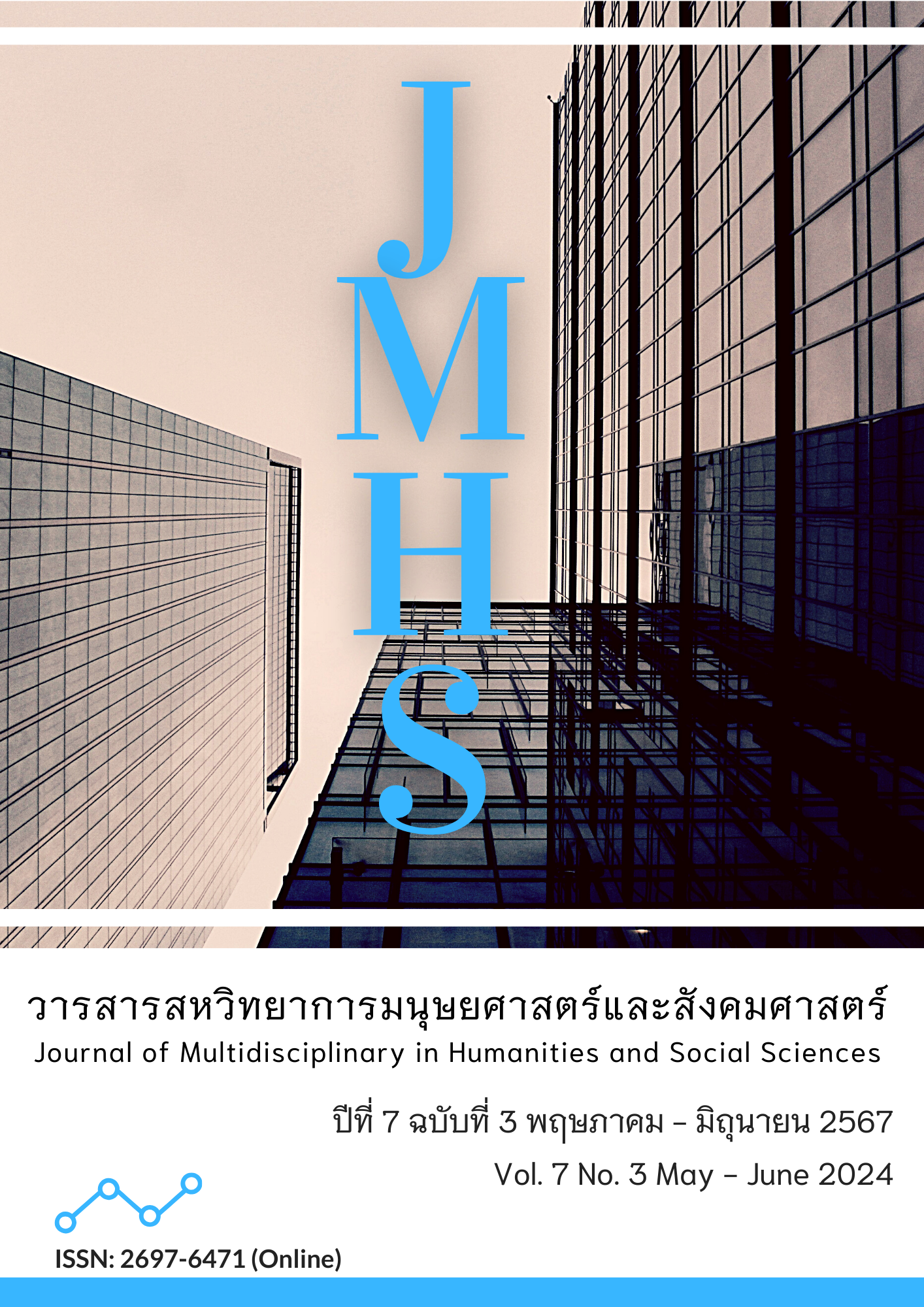Development of an Instructional System Platform for Weather Monitoring in Small Schools Within the Chiang Rai Educational Service Area
Main Article Content
Abstract
The objectives of this article were to: 1) develop an instructional system platform for weather monitoring in small schools; 2) study academic achievement before and after learning with the teaching kit; and 3) investigate teacher and student satisfaction with the teaching set. The research adopted a research and development model. The study sample group comprised 30 Grade 6 students and 6 teachers from schools under the Primary Educational Service Area Office 3, Mae Fah Luang District. The study selected a specific sample group. Four types of tools were used in the research: 1) a weather monitoring teaching kit system platform; 2) pre- and post-learning achievement tests; 3) an innovative media evaluation form; and 4) measures of teacher and student satisfaction with the teaching kit. Analyzed the data using basic statistical methods like mean and standard deviation, with independent t-test analysis.
The research results revealed that: 1. The components of an instructional system platform for weather monitoring include: 1) learning management activities; 2) weather measurement equipment; and 3) an online platform. 2. Achievement levels after studying were found to be significantly higher than before studying, with a statistical significance level of.01. 3. Both teachers and students reported the highest level of satisfaction after learning through the platform. From this research, it has been discovered that an instructional system platform for weather monitoring is indeed effective for teaching and learning in small schools, yielding satisfactory outcomes. It can inspire students to generate creative ideas and create inventions by leveraging their acquired knowledge. This teaching kit system platform should be broadly distributed, particularly in schools facing security risks.
Article Details

This work is licensed under a Creative Commons Attribution-NonCommercial-NoDerivatives 4.0 International License.
Views and opinions appearing in the Journal it is the responsibility of the author of the article, and does not constitute the view and responsibility of the editorial team.
References
กรมควบคุมมลพิษ. (2566). สถานการณ์ฝุ่นละออง PM 2.5. สืบค้นจาก https://www.air4thai.com/
พิมพันธ์ เดชะคุปต์ และ พเยาว์ ยินดีสุข. (2563). การเรียนรู้เชิงรุกแบบรวมพลังกับ PLC เพื่อการพัฒนา. กรุงเทพฯ: โรงพิมพ์แห่งจุฬาลงกรณ์มหาวิทยาลัย.
มนต์ชัย เทียนทอง (2555). ระเบียบวิธีวิจัยทางคอมพิวเตอร์ศึกษา. กรุงเทพฯ: แดเน็กซ์ อินเตอร์ คอร์ปอเรชั่น.
วิชิต เทพประสิทธิ์. (2565). โครงการส่งเสริมการจัดการเรียนรู้เครือข่ายโรงเรียนขนาดเล็ก รายวิชาวิทยาการคำนวณ. เชียงราย: มหาวิทยาลัยราชภัฏเชียงราย.
วิชิต เทพประสิทธิ์ (2565). การพัฒนาชุดการสอน "นวัตกรรมโรงเรียนปลอดภัย" โดยใช้การจัดการเรียนรู้แบบโครงงานเป็นฐาน ร่วมด้วยอุปกรณ์ระบบสมองกลฝังตัว ในหลักสูตรความปลอดภัยรอบด้านในโรงเรียน สำหรับนักเรียนระดับชั้นประถมศึกษาปีที่ 4-6 ในจังหวัดเชียงราย. ใน การประชุมวิชาการระดับชาติพิบูลสงครามวิจัย ครั้งที่ 7 การวิจัยและนวัตกรรมเพื่อความยั่งยืนภายใต้ชีวิตวิถีใหม่ (pp. 35-43). พิษณุโลก: สถาบันวิจัยและพัฒนา มหาวิทยาลัยราชภัฏพิบูลสงคราม.
เศรษฐ์ สัมภัตตะกุล. (2018). การวิเคราะห์ปริมาณฝุ่นละอองเชิงมวล PM2.5 และ PM10 ในบรรยากาศด้วยเครื่องตรวจวัดฝุ่นละอองไร้สายในพื้นที่ภาคเหนือของประเทศไทย. วารสารวิจัยเทคโนโลยีนวัตกรรม, 2(1), 65-78.
สำนักงานเขตพื้นที่การศึกษาประถมศึกษาเชียงราย (สพป.เชียงราย). (2564). รายงานประจำปี สำนักงานเขตพื้นที่การศึกษาประถมศึกษาเชียงราย. เชียงราย: สพป.เชียงราย.
องค์กรช่วยเหลือเด็ก. (2560). ความปลอดภัยรอบด้านในโรงเรียน (เอกสารแผ่นพับ). กรุงเทพฯ: องค์กรช่วยเหลือเด็ก.
องค์การแพลนอินเตอร์เนชั่นแนล. (2564). รายงานการประชุมสรุปผลโครงการ Girls' Next Gen: Teenage Programmers Youth Camp Micro: Bit Workshop. เชียงราย.
Ally, M. (2008). Foundations of educational theory for online learning. The Theory and Practice of Online Learning, 15-44.
BBC Learning. (2024). BBC micro: bit. Retrieved from Introducing the BBC micro:bit: https://www.microbit.org/
Brown, J. S. (2008). Minds on fire: Open education, the long tail, and Learning 2.0. EDUCAUSE Review, 43(1), 16-32.
Cederqvist, A. (2020). An exploratory study of technological knowledge when pupils are designing a programmed technological solution using BBC Micro: bit. International Journal of Technology and Design Education, 32, 355-381. DOI:10.1007/s10798-020-09618-6
Freeman, S. E. (2014). Active learning increases student performance in science, engineering, and mathematics. Proceedings of the National Academy of Sciences, 111(23), 8410-8415.
High, K. (2014). The effects of integrating mobile devices with teaching and learning on students' learning performance: A meta-analysis and research synthesis. Computers & Education, 77, 35-47.
Huang, Y. M. (2015). Implementing a project-based learning approach in an introductory property course. International Journal of Engineering Education, 31(1), 1-11.
Husain, A. M. (2016). Air quality monitoring: The use of arduino and android. Journal of Modern Science and Technology, 4(1), 86-96.
Marginson, S. T. (2013). STEM: Country comparisons: International comparisons of science, technology, engineering and mathematics (STEM) education. Final report. Australian Council of Learned Academies.
Prince, M. (2004). Does active learning work? A review of the research. Journal of Engineering Education, 93(3), 223-231.
Sentance, S. W. (2017). Teaching with physical computing devices: Exploring the use of the BBC micro: bit in UK schools. Computer Science Education, 27(2-3), 46-67.
Singh V., & Thurman A. (2019). How many ways can we define online learning? A systematic literature review of definitions of online learning (1988-2018). American Journal of Distance Education, 33(4), 289-306.
Smith, J. A. (2011). Is active learning like broccoli? Student perceptions of active learning in large lecture classes. Journal of the Scholarship of Teaching and Learning, 11(1), 53-61.
Thepprasit, W., Thepprasit, R., & Sintanakul, K. (2023). Development of Instructional Media with Embedded Devices System to Enhance Computing Science Instruction in Chiang Rai Province’s Small Schools. Cultivating Sustainable and Equitable Education for All (pp. 77- 83). Songkla: Faculty of Education, Prince of Songkla University.
Voštinár, P., & Knežník, J. (2020). Education with BBC micro: bit. International Journal of Online and Biomedical Engineering (iJOE), 16(14), 81. https://doi.org/10.3991/ijoe.v16i14.17071
Wangsalae, S., & Swengam, W. (2021). Guidelines of computing science instruction for lower secondary school. Journal of the Association of Researchers, 26(1), 116-132.
Wong, G., & Jiang, S. (2018). Computational Thinking Education for Children: Algorithmic Thinking and Debugging. 2018 IEEE
International Conference on Teaching, Assessment, and Learning for Engineering (TALE), (pp. 328-334). Wollongong, NSW, Australia.


